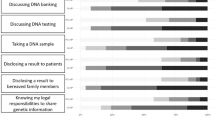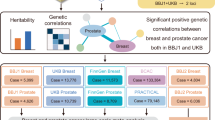Abstract
Palliative care may be an opportunity to discuss cancer family history and familial cancer risks with patients’ relatives. It may also represent the last opportunity to collect, from dying patients, clinical data and biospecimens that will inform cancer risk assessment and prevention in their surviving relatives. This study aims to explore the perspectives of cancer patients’ relatives about cancer heritability, addressing cancer family history, and performing genetic testing in palliative care settings. Thirteen first-degree relatives of cancer patients who died in palliative care participated in the study. Two focus groups were conducted and transcribed verbatim. Two independent coders conducted a thematic content analysis. The themes included: (1) Knowledge of cancer heritability; (2) Experiences and expectations regarding cancer family history discussions, and (3) Views on genetic testing in palliative care patients and DNA biobanking. Participants seemed aware that cancer family history is a potential risk factor for developing the disease. They considered the palliative care period an inappropriate moment to discuss cancer heritability. They also did not consider palliative care providers as appropriate resources to consult for such matters as they are not specialized in this field. Participants welcomed DNA biobanking and genetic testing conducted at the palliative care patients’ request. Cancer occurrence within families raises concerns among relatives about cancer heritability, but the palliative care period is not considered the most appropriate moment to address this issue. However, discussions about the risk to cancer patients’ relatives might need to be considered on a case-by-case basis.
Similar content being viewed by others
Log in or create a free account to read this content
Gain free access to this article, as well as selected content from this journal and more on nature.com
or
References
Pharoah PD, Day NE, Duffy S, Easton DF, Ponder BA. Family history and the risk of breast cancer: a systematic review and meta-analysis. Int J Cancer. 1997;71:800–9.
Noe M, Schroy P, Demierre MF, Babayan R, Geller AC. Increased cancer risk for individuals with a family history of prostate cancer, colorectal cancer, and melanoma and their associated screening recommendations and practices. Cancer Causes Control. 2008;19:1–12.
Bevier M, Sundquist K, Hemminki K. Risk of breast cancer in families of multiple affected women and men. Breast Cancer Res Treat. 2012;132:723–8.
Gonthier C, Pelletier S, Gagnon P, Marin A, Chiquette J, Gagnon B, et al. Issues related to family history of cancer at the end of life: a palliative care providers’ survey. Fam Cancer. 2018;17:303–7.
Dearing A, Taverner N. Mainstreaming genetics in palliative care: barriers and suggestions for clinical genetic services. J Community Genet. 2018;9:243–56.
Cleophat JE, Pelletier S, Joly Y, Gagnon P, Dery A, Marin A, et al. Addressing cancer family history at the end of life: How frequent, relevant, and feasible is it?: a survey of palliative care providers. Palliat Med. 2019;33:856–8.
Niendorf KB, Geller MA, Vogel RI, Church TR, Leininger A, Bakke A, et al. A model for patient-direct screening and referral for familial cancer risk. Fam Cancer. 2016;15:707–16.
Hampel H, Bennett RL, Buchanan A, Pearlman R, Wiesner GL, Guideline Development Group ACoMG. et al. A practice guideline from the American College of Medical Genetics and Genomics and the National Society of Genetic Counselors: referral indications for cancer predisposition assessment. Genet Med: Off J Am Coll Med Genet. 2015;17:70–87.
Hartmann LC, Lindor NM. The role of risk-reducing surgery in hereditary breast and ovarian cancer. New Engl J Med. 2016;374:454–68.
Roeland EJ, Dullea AD, Hagmann CH, Madlensky L. Addressing hereditary cancer risk at the end of life. J Oncol Pract. 2017;13:e851–6.
Lillie AK, Clifford C, Metcalfe A. Caring for families with a family history of cancer: why concerns about genetic predisposition are missing from the palliative agenda. Palliat Med. 2011;25:117–24.
Ingleby LJ. Clinical genetics in a palliative care setting: a qualitative exploration of the barriers and levers staff report when discussing family risk of BRCA1 and BRCA2 mutations. Leicester: University of Leicester; 2015.
Metcalfe A, Pumphrey R, Clifford C. Hospice nurses and genetics: implications for end-of-life care. J Clin Nurs. 2010;19:192–207.
Elo S, Kyngas H. The qualitative content analysis process. J Adv Nurs. 2008;62:107–15.
Quillin JM, Bodurtha JN, Siminoff LA, Smith TJ. Physicians’ current practices and opportunities for DNA banking of dying patients with cancer. J Oncol Pract. 2011;7:183–7.
Abusamaan MS, Quillin JM, Owodunni O, Emidio O, Kang IG, Yu B, et al. The role of palliative medicine in assessing hereditary cancer risk. Am J Hosp Palliat Care. 2018;35:1490–7.
Quillin JM, Emidio O, Ma B, Bailey L, Smith TJ, Kang IG, et al. High-risk palliative care patients’ knowledge and attitudes about hereditary cancer testing and DNA banking. J Genet Couns. 2018;27:834–43.
Lillie A. The missing discourse:how does the family history of cancer affect the care needs of palliative care patients? Birmingham: University of Birmingham; 2009.
Krakow M, Ratcliff CL, Hesse BW, Greenberg-Worisek AJ. Assessing genetic literacy awareness and knowledge gaps in the US population: results from the health information national trends survey. Public Health Genomics. 2017;20:343–8.
Kitzinger J. Qualitative research. Introducing focus groups BMJ. 1995;311:299–302.
Saulnier KM, Chan B, Cinà M, Pelletier S, Dorval M, Joly Y. Communication of genetic information in the palliative care context: ethical and legal issues. Med Law Int. 2018;18:219–40.
Reid GT, Walter FM, Brisbane JM, Emery JD. Family history questionnaires designed for clinical use: a systematic review. Public Health Genomics. 2009;12:73–83.
Cleophat JE, Nabi H, Pelletier S, Bouchard K, Dorval M. What characterizes cancer family history collection tools? A critical literature review. Curr Oncol. 2018;25:e335–50.
de Hoog CL, Portegijs PJ, Stoffers HE. Family history tools for primary care are not ready yet to be implemented. A systematic review. Eur J Gen Pract. 2014;20:125–33.
Qureshi N, Carroll JC, Wilson B, Santaguida P, Allanson J, Brouwers M, et al. The current state of cancer family history collection tools in primary care: a systematic review. Genet Med. 2009;11:495–506.
Acknowledgements
We thank Sue-Ling Chang for linguistic editing of the manuscript.
Funding
This study was funded by the Fonds de Recherche du Québec-Santé and the Direction générale de Cancérologie du Québec. JEC is a recipient of scholarships from the Fonds d’Enseignement et de Recherche (Faculty of Pharmacy, Laval University), Laval University Cancer Research Center, Laval University Research Chair in Palliative Care, and the Fonds de Recherche du Québec-Santé. HN holds an Investigator Award (Junior 2) from the Fonds de recherche du Québec-Santé.
Author information
Authors and Affiliations
Corresponding author
Ethics declarations
Conflict of interest
The authors declare that they have no conflict of interest.
Ethical approval
This study was approved by the Research Ethics Review Board of the CHU de Québec-Université Laval (Quebec City University Hospital-Laval University). During the recruitment process, participants were provided with information about the study and on their rights and responsibilities. Each participant signed a consent form before the focus group. First names only were used during group discussions to maintain confidentiality. To report participants’ quotes, first names were replaced by numbers. Participants were informed that research team members (JEC, AM, HN, MD, SP) would be observing the focus group sessions behind a one-way mirror to record field notes.
Additional information
Publisher’s note Springer Nature remains neutral with regard to jurisdictional claims in published maps and institutional affiliations.
Supplementary information
Rights and permissions
About this article
Cite this article
Cléophat, J.E., Marin, A., Pelletier, S. et al. What do cancer patients’ relatives think about addressing cancer family history and performing genetic testing in palliative care?. Eur J Hum Genet 28, 213–221 (2020). https://doi.org/10.1038/s41431-019-0505-3
Received:
Revised:
Accepted:
Published:
Version of record:
Issue date:
DOI: https://doi.org/10.1038/s41431-019-0505-3
This article is cited by
-
Approaching discussions about genetics with palliative patients and their families: a qualitative exploration with genetic health professionals
European Journal of Human Genetics (2023)
-
Variation among DNA banking consent forms: points for clinicians to bank on
Journal of Community Genetics (2022)
-
Demographic and socioeconomic trends in DNA banking utilization in the USA
Journal of Community Genetics (2021)



